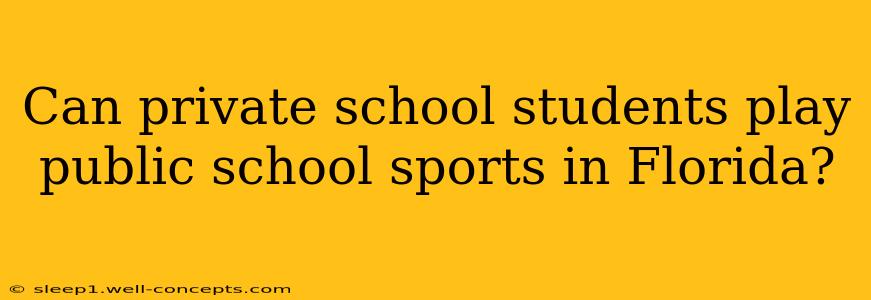The question of whether private school students can participate in Florida public school sports is a complex one, without a simple yes or no answer. The eligibility hinges on several factors, primarily governed by the Florida High School Athletic Association (FHSAA). While there isn't a blanket prohibition, significant restrictions exist. Let's break down the key aspects.
FHSAA Regulations: The Guiding Principles
The FHSAA is the governing body for high school athletics in Florida. Their rules regarding the participation of private school students in public schools are designed to maintain fairness and prevent competitive imbalances. The core principle revolves around the concept of open enrollment.
Open Enrollment and its Implications
Open enrollment, generally speaking, refers to a student's ability to attend a public school outside their assigned district. If a private school student is enrolled in a public school via an open enrollment program, their eligibility for sports participation is often reviewed on a case-by-case basis. Key considerations include:
- Residency: The student must meet the residency requirements of the public school district. This often involves proof of address and other documentation demonstrating genuine residency.
- Transfer Rules: The FHSAA has strict transfer rules. If a student transfers from a private school to a public school, their athletic eligibility might be restricted, depending on the circumstances of the transfer. Suspicions of "recruiting" or attempts to gain an athletic advantage can lead to ineligibility.
- Academic Eligibility: The student must meet all academic requirements set by both the FHSAA and the specific public school.
Private School Sports Programs: A Complicating Factor
The existence of a robust private school sports program is another significant factor. If the student is already participating in a significant way in athletics at their private school, their eligibility to then join a public school team is more likely to be scrutinized. The FHSAA aims to prevent students from maximizing their athletic opportunities by playing for multiple schools.
Seeking Clarification: The Importance of Direct Contact
Navigating these complexities requires direct engagement with the relevant authorities:
- The FHSAA: Their website provides detailed information on eligibility rules and regulations. Contacting them directly is crucial for obtaining the most up-to-date and precise information.
- The Public School Athletic Director: This individual will be intimately familiar with the specific rules and policies of their school and district.
- The School District's Open Enrollment Office: Understanding the nuances of the open enrollment process is vital.
Beyond the Rules: Ethical Considerations
Beyond the formal rules, ethical considerations play a role. The spirit of the regulations aims to prevent unfair advantages and maintain competitive balance. Any attempt to circumvent the rules for athletic gain could lead to penalties for both the student and the school.
Conclusion: No Simple Answer, Careful Consideration Required
Whether a private school student can play public school sports in Florida isn't a simple yes or no. It depends heavily on individual circumstances, adhering to FHSAA regulations, and meeting residency, transfer, and academic requirements. Proactive communication with the FHSAA, the school's athletic director, and the district's open enrollment office is essential to ensure compliance and eligibility. Always prioritize ethical conduct and fair play in navigating this complex process.

